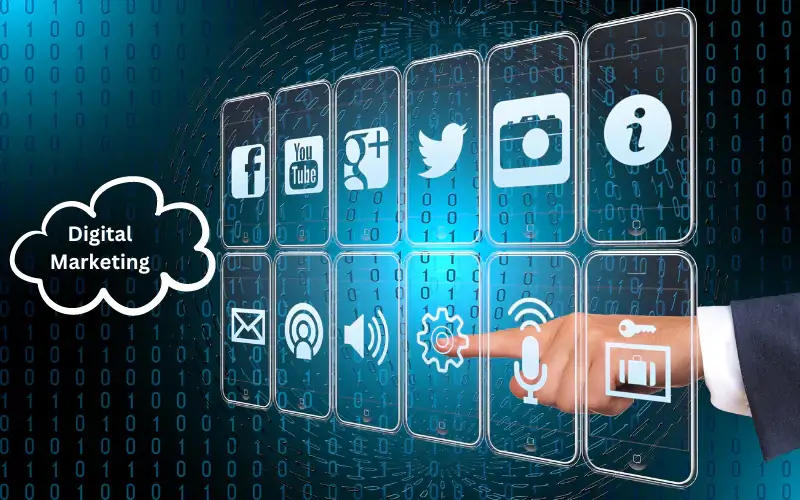What is Digital Marketing

Digital marketing is the use of online channels such as websites, social media, search engines, email, and mobile apps to engage customers and promote products or services. It includes a variety of tactics for reaching and engaging target audiences, increasing traffic, generating leads, and, ultimately, meeting company objectives in the world of the internet.
What is meant by digital marketing?
Unlike traditional marketing, digital marketing provides precise targeting, real-time statistics, and a wide range of methods, including content marketing, social media marketing, search engine optimization (SEO), pay-per-click (PPC) advertising, email marketing, and others. In essence, it is about leveraging digital technology to reach, engage, and convert potential customers in an increasingly digital world.
Are you looking for web design services? Go here for web design and development services.
What are digital marketing and SEO?
Digital Marketing:
Digital marketing refers to numerous online techniques and tactics used to promote items or services via digital channels such as search engines, social media, email, websites, and mobile apps.
SEO (Search Engine Optimization):
SEO (Search Engine Optimization) is an important aspect of digital marketing that focuses on improving a website's visibility and ranking in search engine results pages (SERPs). Digital marketers use SEO tactics such as keyword research, on-page optimization, link building, and content production to enhance organic (non-paid) search engine traffic to their websites. In essence, SEO is a critical component of digital marketing that enables websites to attract more relevant visitors and boost their online visibility.
Does your business require these two services? SEO and Digital Marketing Go via this link to acquire a quote.
What are internet marketing and online marketing?
Both are the same. Internet marketing and online marketing are frequently used interchangeably to describe the same concept: advertising items or services through digital channels on the internet. However, there may be subtle variances in interpretation.
Internet Marketing: This term often refers to marketing efforts that are solely focused on promoting items or services via online channels such as websites, search engines, email, social media, and advertising platforms. It stresses the use of the internet as the principal channel for marketing efforts.
Online Marketing: While comparable to internet marketing, online marketing has a broader scope and can include a wider range of digital channels than just the internet. Marketing efforts may involve mobile apps, digital TV, streaming services, and other digital platforms, in addition to traditional internet-based methods. Online marketing recognizes the interconnection of many digital platforms for reaching and engaging target consumers.
What is ppc in digital marketing?
PPC, or pay-per-click, is a digital marketing technique in which advertisers pay a fee each time their ad is clicked. It is a method of purchasing visits to your website rather than trying to obtain them organically.
PPC advertising involves advertisers bidding on keywords that are related to their target audience. When people search for certain keywords, the advertiser's ads may display at the top or bottom of the search engine results pages (SERPs), labeled "sponsored" or "ad."
PPC platforms, such as Google Ads and Bing Ads, enable advertisers to develop and manage campaigns, set budgets, and specify targeting characteristics such as location, demographics, and device type. The cost per click (CPC) of an ad is determined by several factors, including the competitiveness of the keyword, the quality and relevance of the ad, and the advertiser's bid amount.
PPC advertising provides advertisers with a highly focused and measurable means to reach their audience because they only pay when visitors click on their ads. When managed strategically, it may effectively drive website traffic, generate prospects, and increase conversions.
Which industry needs digital marketing?
Below is the list shown
Healthcare
Entertainment
Food
Legal/Law Firms
Retail Industry
Education
Fitness & Nutrition
E-commerce
Real-estate
Conclusion:
Digital marketing is a dynamic and necessary component of modern corporate strategies. Businesses that use digital channels such as websites, social media, search engines, email, and mobile apps may efficiently interact with their target consumers, drive engagement, and achieve their marketing goals.
With its varied set of approaches and tools, digital marketing provides organizations with unprecedented potential to reach, engage, and convert clients in an increasingly digital environment.
Embracing digital marketing is not only advantageous; it is necessary for being competitive and relevant in today's continuously changing economy.



